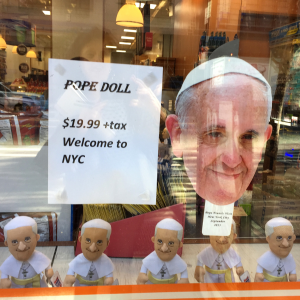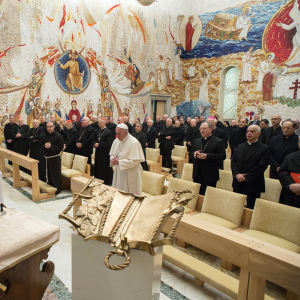Pope Francis and his cardinal advisers are to focus their reforming efforts on Church decentralisation.
The Council of Cardinals - known as the C9 - concluded their twelfth meeting from 10-12 December and announced they will dedicate a special session to the topic at their next gathering on the 8-9 February.
The group recognised the importance of a speech the Pope gave during the Synod on the Family on 17 October where he reflected on collegiality, the notion of all bishops sharing in the governance the Church, and “the need to proceed with a healthy decentralisation.”
This speech, they added, was important in relation to the reform of the Roman Curia which the C9 has been tasked with overseeing.
In the October speech the Pope said there is a need to integrate and update “certain aspects of the ancient ecclesiastical organisation” by giving more responsibility to local church structures, particularly bishops’ conferences. This, he explained, was something envisioned by the Second Vatican Council but has yet to come to fruition. The Pope also stressed that the Church should be synodal at every level - meaning local churches making decisions with Rome.
The C9 is also advising on a restructure of the Roman Curia that is to include new departments. One, dedicated to laity, family and life, was announced by Francis during the synod and its formal creation is due soon. Another dicastery, Justice, Peace and Migration, is also likely to be formally announced soon. These new departments will incorporate existing Vatican dicasteries and there has been speculation that they could be led by lay people.
Perhaps the most pressing matter of reform, however, has been the overhaul of Holy See finances. The issue has become pressing following the publication of two books based on leaked documents, a scandal known as Vatileaks 2, revealing mismanagement of Vatican money and resistance to Francis’ reforms. Three people suspected of leaking are currently on trial along with the two journalists who wrote the book.
The C9 heard from Cardinal Reinhard Marx, who is the co-ordinator of the Council for the Economy, the overarching body in charge of Vatican finances, on the appointment of PricewaterhouseCoopers as external auditors. It is the first time an outside body has been called on for a full audit of the Holy See’s books.
The appointment of PwC has occurred at the same time as the creation of a new working group to look at the Vatican’s economic future including income and expenditure. The group has been set up by Cardinal George Pell, the Prefect of the Secretariat for the Economy, and includes representatives of the Secretariat of State, the Vatican City State, the Vatican Bank (the Institute for the Works of Religion), the Secretariat for Communications, APSA (which controls assets and money that in turn fund the curia’s work) and the Congregation for the Evangelisation of Peoples. The latter has large property holdings.
Francis is determined to introduce transparency into the Holy See’s finances while at the same time ensuring that resources are channelled to support the Church’s work with good causes.
KEEP UP TO DATE ON TWITTER AND FACEBOOK...
Follow all the latest news and events from the Catholic world via The Tablet's Twitter feed @the_tablet
Or you can join in the debate at our community page on Facebook




 Loading ...
Loading ...